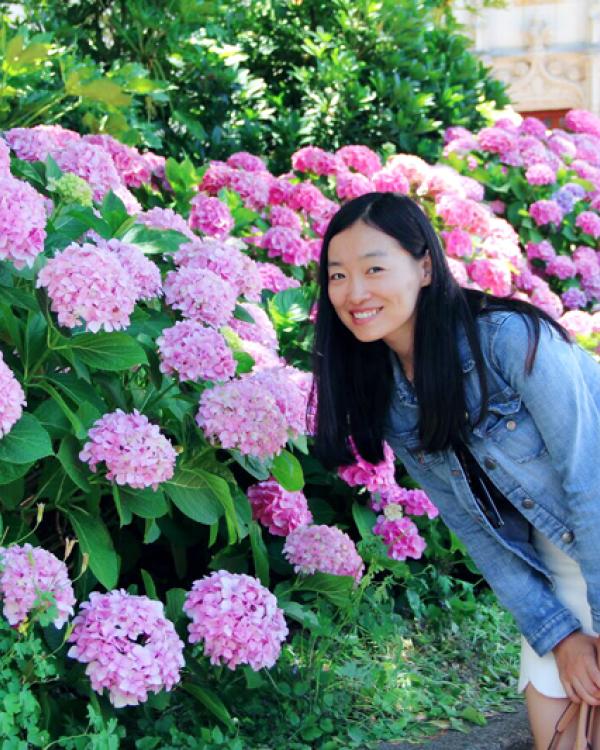
As a doctoral candidate in the Department of Education, Tiange Wang aims to support students’ bilingual and bi-literacy development through her research at a Chinese-English Dual Language Immersion (DLI) program. Although she is currently collecting research in the Midwest, Tiange shared some of her favorite moments so far and what motivates her to keep going through this journey.
GGSE: Tell us a little about your research and how you came to choose the topic.
Wang: My current research project examines the curriculum and its implementation in a Chinese-English Dual Language Immersion (DLI) program. The goals of DLI programs include that students will develop high level of proficiency in both their first and second language. Curriculum plays a major role in achieving these programmatic goals. Yet, relatively little is known about the curricula and the implementation in especially less commonly taught language combination DLI programs, such as Chinese-English programs. By collecting the curriculum materials, conducting interviews with teachers and doing classroom observations, my research explores the decisions made by and challenges faced by teachers in their selection and implementation of the Chinese and English language arts curricula in order to better align with the goals of DLI programs.
I chose this topic because curriculum planning and implementation have long been a major challenge in Chinese-English DLI programs, especially when we consider the typological distance between English and Chinese as well as the differences between eastern and western teaching philosophies. So the aim of my research is to help future Chinese-English DLI program teachers to make informed decisions on curriculum implementation to support students’ bilingual and bi-literacy development.
GGSE: Have there been any surprising discoveries or memorable moments during your time collecting research for your dissertation?
Wang: Speaking of memorable moments, once an English language arts teacher at the Chinese-English DLI School shared with me a story that was not directly related to my research questions but really struck me. The teacher told me that the Chinese-English DLI School had been sharing the same building with another public school, and at first children of her school were called “weird kids in the building” by students of the other school because the immersion students spoke Chinese and sang Chinese songs. Students at the immersion school were mostly white, and when they spoke Chinese in the building, it became such a different presence to other kids. The teachers at the DLI immersion school told their students that “being different is awesome,” and the tension has been eased over time. But I kept thinking that it is still a long way to go to build a more tolerant and healthier society and better prepare each child with a well-rounded cultural perspective to interact with the world around them.
On the personal front, during my time collecting research data, I realized that stepping into a research site was not only a process to address the research questions, but also a great opportunity for knowledge building. I have learned so much from my observation of the classes and conversations with the teachers. Although I have been reading theories on, for example, bilingualism, second language acquisition and Chinese language teaching pedagogies, only when I see how learning happens in actual classrooms do I feel those theories suddenly become alive in my mind and I start to see how I can apply those theories to understand what I observe. The problems and challenges that teachers have encountered in their daily instruction in turn push me to read more and draw on resources from the research field to figure out possible solutions. This bi-directional reinforcement between theory and application has deepened my understanding of my research emphasis and enlightened my experiences as a researcher.
GGSE: What has been a source of motivation or drive for you in your graduate studies?
Wang: Pursuing graduate studies is a challenging endeavor, with constant struggles and frustrations. Aside from the interest in doing research and the urge of wanting to know more, for me teamwork is also a drive to push me forward. Whenever I am stuck in my research, my advisor, committee members and lab mates always provide me with constructive suggestions and push me back on the right track. Also interacting with my research participants is another source of motivation. Their questions and struggles allow me to see the value of doing research. Whenever I think of the possibilities that my research could provide some implications for their daily instruction, I feel that the countless hours that I spend in observing, transcribing and analyzing are all worthwhile, and that sense of fulfillment overcomes all the struggles and frustrations.
GGSE: Any hobbies or pastimes?
Wang: I like cooking very much, partly because I like good food. Also I think it is a good way to reset or clear up my mind. While I’m preparing the ingredients and different spices, I can temporally get my mind off the academic work and give my brain a rest. I also like travelling; interacting with different people, listening to different languages and looking at different landscapes allow me to appreciate the richness and beauty of life.